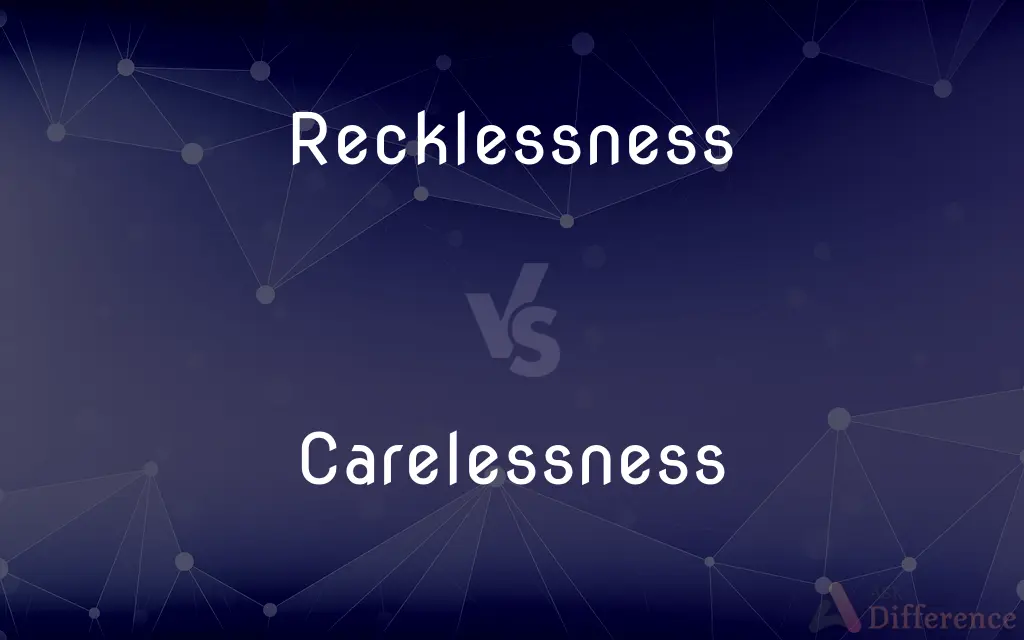Recklessness vs. Carelessness — What's the Difference?
By Tayyaba Rehman — Published on January 17, 2024
Recklessness denotes a willful disregard for consequences, while carelessness indicates an unintended lack of attention or caution.

Difference Between Recklessness and Carelessness
Table of Contents
ADVERTISEMENT
Key Differences
Recklessness and carelessness are terms that relate to one's attitude or behavior towards potential risks or outcomes. Recklessness implies a conscious decision to act without considering the consequences. Someone who is reckless knows there might be risks involved but chooses to ignore or dismiss them. On the other hand, carelessness denotes an inadvertent failure to notice or consider potential hazards. It's an unintentional oversight, often stemming from distraction or lack of awareness.
Both recklessness and carelessness can lead to unintended consequences or harm. However, the primary difference between them lies in the intent behind the actions. Recklessness has a sense of daring or boldness to it. It often carries a more negative connotation because the person is seen as willingly taking unnecessary risks. Carelessness, meanwhile, doesn't necessarily imply that one is taking risks on purpose. Instead, it suggests that someone might not be paying enough attention or being as cautious as they should be.
In legal contexts, the distinction between recklessness and carelessness can be significant. Recklessness might be viewed as a more serious offense since it indicates a willful disregard for safety or rules. Carelessness, although still potentially problematic, is seen as less blameworthy because it's not a conscious choice to be negligent.
In everyday language, we often use these terms to describe someone's attitude or actions. If someone speeds down a residential street, we might label them as reckless. If someone forgets to lock their front door when leaving home, we'd probably describe them as careless. Both terms highlight a lack of proper care or caution, but they emphasize different reasons for such behavior.
Comparison Chart
Intent
Willful disregard for consequences.
Unintended lack of attention.
ADVERTISEMENT
Connotation
Often negative, implies boldness.
Implies oversight, less blameworthy.
Legal Implications
Typically seen as a more severe fault.
Seen as less blameworthy.
Resultant Behavior
Purposeful risk-taking.
Inadvertent mistakes.
Associated Feelings
Daring, boldness.
Distraction, inattention.
Compare with Definitions
Recklessness
A deliberate disregard for danger or consequences.
Driving at high speeds in a crowded area shows recklessness.
Carelessness
Overlooking details due to inattention.
Misspelling names on an official document indicates carelessness.
Recklessness
Acting without caution despite knowing the risks.
Investing all your money without research is financial recklessness.
Carelessness
Not being cautious or wary enough.
Not checking expiration dates on products can be a result of carelessness.
Recklessness
Taking actions that one knows could lead to harm or danger.
Not wearing protective gear in a hazardous environment is an act of recklessness.
Carelessness
Acting without thought, often leading to mistakes.
Forgetting one's keys at a cafe is a moment of carelessness.
Recklessness
A brazen or heedless attitude towards potential negative outcomes.
Choosing to go hiking during a storm warning is recklessness.
Carelessness
An unintentional failure to give proper attention or care.
Leaving the oven on while going out is an act of carelessness.
Recklessness
A willful indifference to the safety of oneself or others.
Ignoring safety protocols during a fire drill is sheer recklessness.
Carelessness
Lacking in precision or diligence.
A report full of errors reflects carelessness.
Recklessness
Acting or done with a lack of care or caution; careless or irresponsible.
Carelessness
Taking insufficient care; negligent
A careless housekeeper.
Careless proofreading.
Recklessness
The state or quality of being reckless or heedless, of taking unnecessary risks.
His recklessness repeatedly put him in danger.
Carelessness
Marked by or resulting from lack of forethought or thoroughness
A careless mistake.
Recklessness
The trait of giving little thought to danger
Carelessness
Showing a lack of consideration
A careless remark.
Carelessness
Unconcerned or indifferent; heedless
Careless of the consequences.
Carelessness
Unstudied or effortless
Danced with careless grace.
Carelessness
Exhibiting a disposition that is free from cares; cheerful
A careless grin.
A careless wave of the hand.
Carelessness
Lack of care; the state or quality of being careless.
This accident was caused by carelessness.
Carelessness
The quality or state of being careless; heedlessness; negligence; inattention.
Carelessness
The quality of not being careful or taking pains
Carelessness
Failure to act with the prudence that a reasonable person would exercise under the same circumstances
Common Curiosities
What does carelessness often stem from?
An unintentional oversight or lack of attention.
Which term carries a more negative connotation?
Recklessness.
Is recklessness a conscious decision?
Yes, recklessness implies a conscious choice to act without considering potential risks.
Does carelessness imply intentionality?
No, carelessness is typically inadvertent and unintentional.
In legal terms, which is often seen as more blameworthy?
Recklessness.
Which term indicates a willful disregard for consequences?
Recklessness.
What might cause someone to be careless?
Distraction, inattention, or oversight.
Are both recklessness and carelessness potentially harmful?
Yes, both can lead to unintended consequences or harm.
If someone deliberately breaks safety rules, are they being careless?
No, that's an act of recklessness.
If someone knows the risks but still takes them, are they reckless or careless?
Reckless.
Is someone who forgets to lock their door being reckless?
No, that's typically seen as carelessness.
What feeling is often associated with recklessness?
Daring or boldness.
Can carelessness be a result of simply overlooking something?
Yes, carelessness often involves overlooking details.
Is someone who engages in risky behavior without concern for others being careless?
No, that behavior is more in line with recklessness.
Is carelessness always a result of not paying enough attention?
Often, but not always. It can also result from oversight or lack of knowledge.
Share Your Discovery

Previous Comparison
Cast Iron vs. Wrought Iron
Next Comparison
JDBC vs. ODBCAuthor Spotlight
Written by
Tayyaba RehmanTayyaba Rehman is a distinguished writer, currently serving as a primary contributor to askdifference.com. As a researcher in semantics and etymology, Tayyaba's passion for the complexity of languages and their distinctions has found a perfect home on the platform. Tayyaba delves into the intricacies of language, distinguishing between commonly confused words and phrases, thereby providing clarity for readers worldwide.
















































